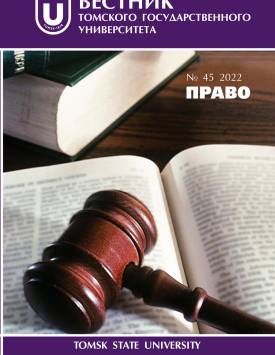Unnamed procedural actions in Russian civil proceedings
The article formulates the content of the concept of "unnamed procedural action", as well as the conditions and limits of its application in modern civil proceedings in Russia. The complexity of understanding this phenomenon is due to the presence of a logical contradiction, which manifests itself in the following. On the one hand, the legislator considers permissible only those procedural actions, the list and order of which are legally fixed. On the other hand, the rapid development of public relations increasingly requires participants in the civil process to go beyond the prescriptions existing in the law. This state of affairs suggests that all procedural actions can be divided into two main groups. The first of them is the named procedural actions (procedural actions and the procedure for their commission are provided for in the law). The second is unnamed procedural actions (procedural actions and (or) the procedure for their commission are not provided for by law). We believe that unnamed procedural actions should be considered through the prism of such categories as "legal conduct", "judicial discretion" and "unnamed legal action", the latter of which has been studied in sufficient detail in the theory of civil law. Unnamed legal actions are also present in the theory of criminal procedure, but here they are usually referred to as "other procedural actions". In the theory of civil procedure, there is no mention of the term "unnamed procedural actions" or its analogues. There are no specified categories in the legislation. The conducted research allowed us to draw the following conclusions. All actions committed in the civil process, including those not named, can be considered as part of legal behavior, which is characterized by: 1) Normativity; 2) State control; 3) The presence of legal consequences. In relation to unnamed procedural actions, these signs, especially normativity, receive a slightly different, often broader, content. Nevertheless, if a number of conditions are met, the existence and possibility of their commission in modern civil proceedings is beyond doubt. Thus, we believe that an unnamed procedural action can be defined as a legally fixed or legally determined active behavior of participants in civil proceedings, implemented within the framework of initiated civil proceedings, entailing legal consequences and aimed at timely and correct consideration and resolution of a civil case. The author declares no conflicts of interests.
Keywords
civil proceedings,
legal conduct,
unnamed procedural actionAuthors
| Alekseev Andrey A. | South Ural State University | andrey2164@yandex.ru |
Всего: 1
References
Комиссаров К.И. Судебное усмотрение в советском гражданском процессе // Советское государство и право. 1969. № 4. С. 49-56.
Абушенко Д.Б. Судебное усмотрение в гражданском процессе : автореф. дис.. канд. юрид. наук. Екатеринбург, 1998. 23 с.
Чистякова О.П. Проблема активности суда в гражданском процессе РФ : дис.. канд. юрид. наук. М., 1997. 195 с.
Ахмедов А.Я. Непоименованные договоры в гражданском праве России : дис.. канд. юрид. наук. Саратов, 2015. 199 с.
Магомедов Ш.М. Применение иных мер уголовно-процессуального принуждения : дис. канд. юрид. наук. СПб., 2020. 169 с.
Васьковский Е.В. Курс гражданского процесса: Субъекты и объекты процесса, процессуальные отношения и действия. М. : Статут, 2016. 623 с.
Курочкин С.А. Гражданский процесс как правовая процедура // Российский юридический журнал. 2011. № 3. С. 198-206.
Советский гражданский процесс / под ред. К.И. Комиссарова, В.М. Семенова. М. : Юрид. лит., 1988. 480 с.
Советский гражданский процесс / под ред. Р.Ф. Каллистратовой. 2-е изд., с изм. и доп. М. : Юрид. лит., 1990. 320 с.
Гражданский процесс : учебник / под ред. М.К. Треушникова. 5-е изд., перераб. и доп. М. : Статут, 2014. 960 с.
Жильцова Н., Голиченко М. К вопросу о понятии гражданского процессуального правоотношения // Арбитражный и гражданский процесс. 2007. № 9. С. 25-29.
Власов А.А. Гражданское процессуальное право : учебник. М. : ТК Велби, 2003. 432 с.
Виртук Н.В., Горшенев В.М., Добровольская Т.Н., Иконицкая И.А. и др. Юридическая процессуальная форма. Теория и практика / под ред. В.М. Горшенева, П.Е. Недбайло. М. : Юрид. лит., 1976. 279 с.
Попова Ю.А. Гражданская процессуальная форма - гарантия эффективности правосудия по гражданским делам // Проблемы доступности и эффективности правосудия в арбитражном и гражданском судопроизводстве : материалы Всерос. науч.-практ. конф., Москва 31 января - 1 февраля 2001 г. М. : Лиджист, 2001. С. 193-204.
Рассахатская Н.А. Гражданская процессуальная форма : автореф. дис.. канд. юрид. наук. Саратов, 1995. 19 с.
Теория государства и права : учеб. для юрид. вузов и фактов / С.С. Алексеев, С.И. Архипов, В.М. Корельский и др. ; под ред. В.М. Корельского и В.Д. Перевалова. М. : ИНФРА-М-НОРМА, 1998. 570 с.
О судебной практике по делам о наследовании : Постановление Пленума Верховного Суда РФ от 29 мая 2012 г. № 9 (ред. от 24 декабря 2020 г.) // Российская газета. 2012. 6 июня.
О подготовке гражданских дел к судебному разбирательству : Постановление Пленума Верховного Суда РФ от 24 июня 2008 г. № 11 (ред. от 12 февраля 2012 г.) // Российская газета. 2008. 2 июля.
Афанасьев С.Ф. Значение фактических действий, осуществляемых судами общей юрисдикции при рассмотрении гражданских дел // Российская юстиция. 2012. № 12. С. 32-35.
Концепция единого Гражданского процессуального кодекса Российской Федерации (одобрена решением Комитета по гражданскому, уголовному, арбитражному и процессуальному законодательству ГД ФС РФ от 08.12.2014 № 124 (1). URL: http://www.consultant.ru/document/cons_doc_LAW_172071 (дата обращения: 10.09.2020).
Алексеев А.А. Индивидуальное правовое регулирование как фактор, определяющий содержание гражданской процессуальной формы // Арбитражный и гражданский процесс. 2018. № 2. С. 3-7.
Решение Минусинского городского суда Красноярского края по делу № 2-1904/2015. URL: https://sudact.ru/regular/doc/8ZndllEjCflw/(дата обращения: 15.09.2021).
Решение Привокзального районного суда г. Тулы по делу № 2-569/2015. URL: http://sudact.ru/regular/doc/52RyGjjwRyrd/?page=3®ular-docJype=®ular-court= ®ular-date_from=®ular-case_doc=®ular-workflow_stage=®ular-date_to= &re-gular-area=®ular-txt=беседа&_=1432444928464®ular-judge=&snippet_pos=3256#snippet (дата обращения: 20.09.2021).
Решение Хабаровского районного суда Хабаровского края по делу № 2-929/2015. URL: http://sudact.ru/regular/doc/rElxK9FSO6LQ/?page=10®ular-docJype= ®ular-court=®ular-date_from=®ular-case_doc=®ular-workflow_stage= ®ular-date_to=®ular-area=®ular-txt=беседа&_=1432449949261®ular-judge= &snippet_pos=5110#snippet (дата обращения: 20.09.2021).
Решение Карасукского районного суда Новосибирской области по делу 2- 382/2015. URL: http://sudact.ru/regular/doc/q4wJHVCYzMLV/?page=13®ulardoc_type=®ular-court=®ular-date_from=®ular-case_doc=®ular-workflow_stage=®ular-date_to=®ular-area=®ular-txt=беседа&_=1432450077145®ular-judge=&snippet_pos=738#snippet (дата обращения: 20.09.2021).

